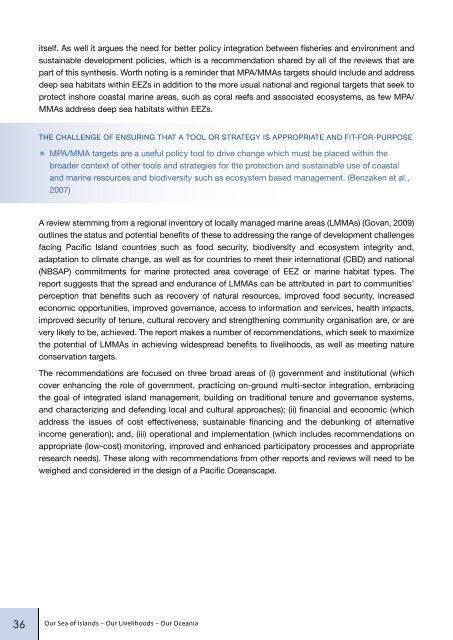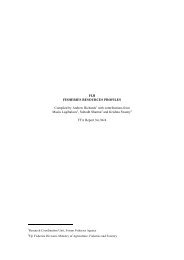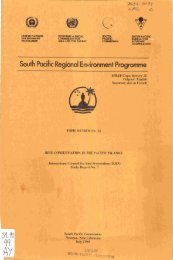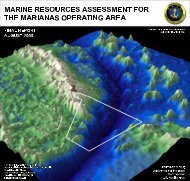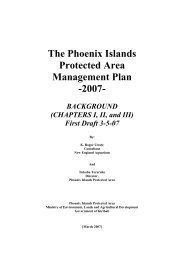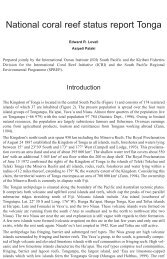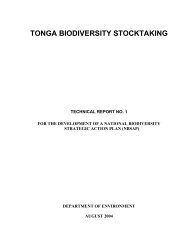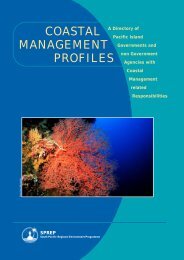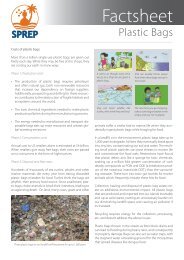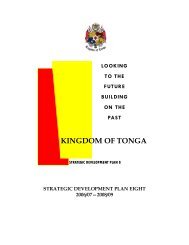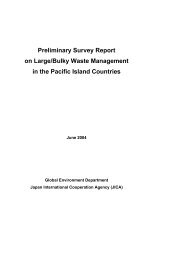Our Sea of Islands Our Livelihoods Our Oceania - SPREP
Our Sea of Islands Our Livelihoods Our Oceania - SPREP
Our Sea of Islands Our Livelihoods Our Oceania - SPREP
You also want an ePaper? Increase the reach of your titles
YUMPU automatically turns print PDFs into web optimized ePapers that Google loves.
itself. As well it argues the need for better policy integration between fisheries and environment and<br />
sustainable development policies, which is a recommendation shared by all <strong>of</strong> the reviews that are<br />
part <strong>of</strong> this synthesis. Worth noting is a reminder that MPA/MMAs targets should include and address<br />
deep sea habitats within EEZs in addition to the more usual national and regional targets that seek to<br />
protect inshore coastal marine areas, such as coral reefs and associated ecosystems, as few MPA/<br />
MMAs address deep sea habitats within EEZs.<br />
THE CHALLENGE OF ENSURING THAT A TOOL OR STRATEGy IS APPROPRIATE AND FIT-FOR-PURPOSE<br />
MPA/MMA targets are a useful policy tool to drive change which must be placed within the<br />
broader context <strong>of</strong> other tools and strategies for the protection and sustainable use <strong>of</strong> coastal<br />
and marine resources and biodiversity such as ecosystem based management. (Benzaken et al.,<br />
2007)<br />
A review stemming from a regional inventory <strong>of</strong> locally managed marine areas (LMMAs) (Govan, 2009)<br />
outlines the status and potential benefits <strong>of</strong> these to addressing the range <strong>of</strong> development challenges<br />
facing Pacific Island countries such as food security, biodiversity and ecosystem integrity and,<br />
adaptation to climate change, as well as for countries to meet their international (CBD) and national<br />
(NBSAP) commitments for marine protected area coverage <strong>of</strong> EEZ or marine habitat types. The<br />
report suggests that the spread and endurance <strong>of</strong> LMMAs can be attributed in part to communities’<br />
perception that benefits such as recovery <strong>of</strong> natural resources, improved food security, increased<br />
economic opportunities, improved governance, access to information and services, health impacts,<br />
improved security <strong>of</strong> tenure, cultural recovery and strengthening community organisation are, or are<br />
very likely to be, achieved. The report makes a number <strong>of</strong> recommendations, which seek to maximize<br />
the potential <strong>of</strong> LMMAs in achieving widespread benefits to livelihoods, as well as meeting nature<br />
conservation targets.<br />
The recommendations are focused on three broad areas <strong>of</strong> (i) government and institutional (which<br />
cover enhancing the role <strong>of</strong> government, practicing on-ground multi-sector integration, embracing<br />
the goal <strong>of</strong> integrated island management, building on traditional tenure and governance systems,<br />
and characterizing and defending local and cultural approaches); (ii) financial and economic (which<br />
address the issues <strong>of</strong> cost effectiveness, sustainable financing and the debunking <strong>of</strong> alternative<br />
income generation); and, (iii) operational and implementation (which includes recommendations on<br />
appropriate (low-cost) monitoring, improved and enhanced participatory processes and appropriate<br />
research needs). These along with recommendations from other reports and reviews will need to be<br />
weighed and considered in the design <strong>of</strong> a Pacific Oceanscape.<br />
36 <strong>Our</strong> <strong>Sea</strong> <strong>of</strong> <strong>Islands</strong> – <strong>Our</strong> <strong>Livelihoods</strong> – <strong>Our</strong> <strong>Oceania</strong>


